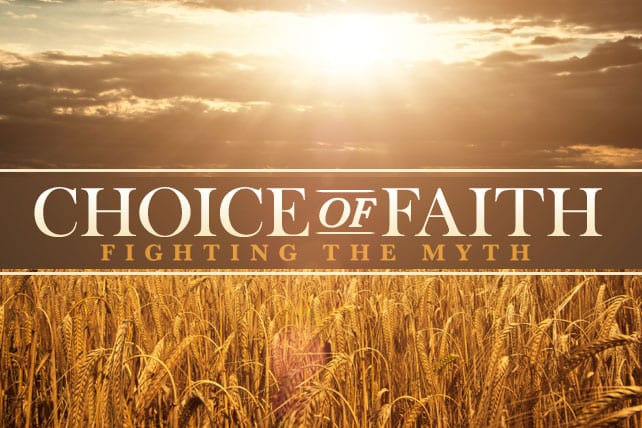There is something that I’ve heard for a while among parents of teenagers regarding Christian faith. The conversation goes something like this…
Me: Hi. I’m Paul. I’m the youth pastor.
Parent: Good to meet you. I have a teen.
Me: Oh! Have I met them?
Parent: No. They don’t come to church with me. And I don’t make them. I think it’s important to not push my faith on them. I want them to choose how they will believe.
Me: OK. Well I hope I get the chance to meet them in the future. (Or some other non-confrontational statement that allows me to skirt around the heart of the issue.)*
Myth of Choice
The heart of the issue is a myth of choice. The myth simply stated is that for a person to have the freedom to choose then they must be completely independent and detached from the choice. It is the same sentiment underlying the pop-culture myth of romance that if you truly love something then you have to let it go and if it returns to you then you know their love is true. And we see these myths played out in movies, songs, novels and daily conversations. We’re so used to hearing this myth about human choice that we never really question it. The reality is that humans just don’t live according to this myth.
First, the myth assumes choice is primarily a thinking activity. To be independent and detached means in our minds we see ourselves outside the choice and think through why or why not we would make the commitment. It’s as though we believe that our higher mental capacity is the only factor in our choosing. And so we lie to ourselves about how much our desires or loves drive our choices. We are keenly aware of our emotion driven choices when we give the advice, “Never go grocery shopping on an empty stomach.” If you’ve been there then you know the most mentally strong person can break down and over purchase because their stomach is driving their food choices.
Second, we often forget that we are creatures of habit. That doesn’t mean we just love routine. It also means that we are formed and informed by our habits. Habits are a much stronger indicator of the choices that a person will make then any other factor. The parent’s habit above is a choice they are informing and forming their child to make. Another way to think about it is that the practice (my parent goes to church and I don’t) is forming a way of life for your teen. In order for a teen to choose Christian faith in this situation they actually have to be formed into a completely different habit or experience a dramatic conversion that transforms their current way of life. So instead of giving them the opportunity to choose their own faith, your habit is actually taking away or deterring them from the choice in Christian faith.
God’s Story
In the beginning, we were created with a choice, but the only way we were shown was communion with God. The goodness of God consumed us. It was our passion. It was a habit to be with God in his overwhelmingly, good creation. The reality that we lived in God’s creation was tangible. Our connection to God was inseparable from the harmony of our connection to others, ourselves and the world. It was from this reality that we chose to create another way of life. You see God created us and gave us a way of life that assumed there was no other way then living in relationship with him. Yet, there was this freedom to choose. Not from a place of autonomy and detachment but a place of intimate connection. And we freely chose to create a new way.
Suggestion
If you truly want to give your child a choice about faith in Jesus then raise them like there is no other choice. I know this might sound like a paradox or nonsense but stay with me. First, in living like faith in Jesus is the only choice, you give them the best opportunity to see a living and active Christian faith. In a world that is in desperate need to see living examples of Jesus followers, your teen will be able to see it and experience it daily. So they’ll get a good understanding of what they would be choosing to leave. Second, in living like there is no other choice but faith in Jesus, you’ll actually show greater respect to your child’s choice. Humans make choices from a place of attachment and connection. We act, think and love our way from choice to choice. From how we choose to eat, exercise, study, to how we choose to pray, serve and worship. You see they are going to be formed and shaped by so many other relationships and habits growing up that the question will never be, “Do they have a choice of who or what they’re following?” The question will always be, “Who or what will you choose to worship this day?”
*NOTE: I realize that my example conversation assumes Christian faith means going to corporate worship. I don’t believe that to be the only Christian practice that indicates faith in Jesus. It is merely one of many which reflect a faithful Jesus follower’s witness.













